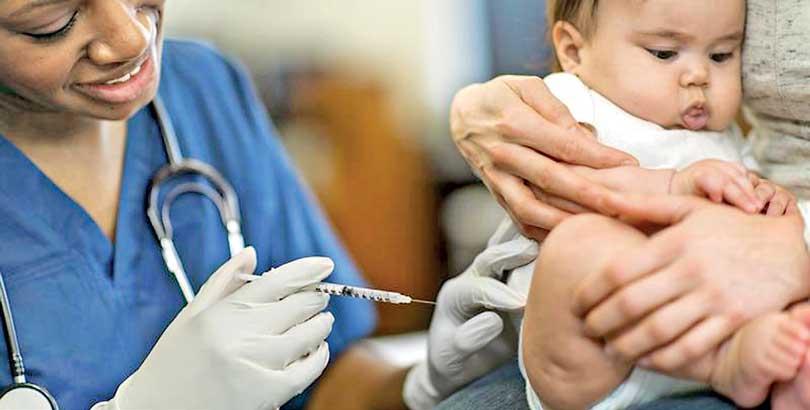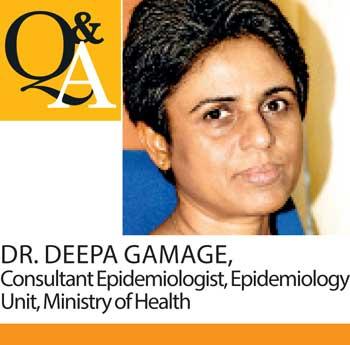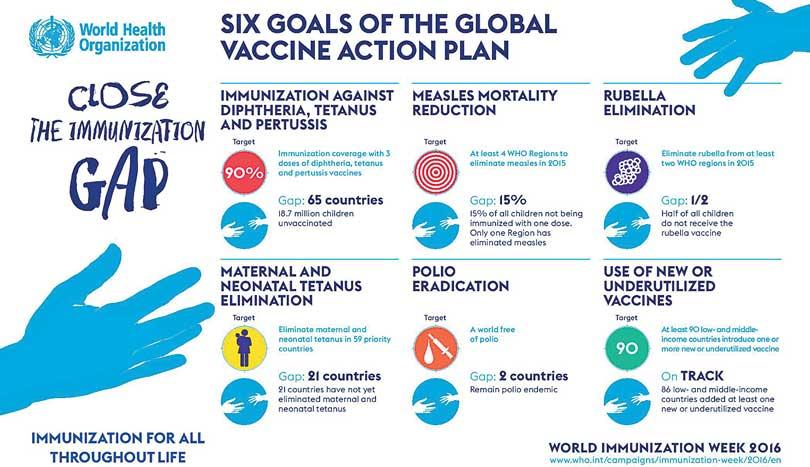26 Apr 2019 - {{hitsCtrl.values.hits}}

 World immunization week which falls on the last week of April every year is a reminder of the importance of vaccinations and the role it plays in the prevention of morbidity and mortality caused by infectious diseases. Dr. Deepa Gamage, Consultant Epidemiologist of the Epidemiology unit, Ministry of health, speaks about immunization, its significance, coverage and success over the years.
World immunization week which falls on the last week of April every year is a reminder of the importance of vaccinations and the role it plays in the prevention of morbidity and mortality caused by infectious diseases. Dr. Deepa Gamage, Consultant Epidemiologist of the Epidemiology unit, Ministry of health, speaks about immunization, its significance, coverage and success over the years.
Importance of Immunization
The introduction of vaccines has helped prevent many occurrences of the contractions of communicable (infectious) diseases. Viruses and bacteria are the most common causative agents of most of the infectious diseases that human health is plagued with today. “The history of the disease and its causative microbial agent, the concerns on the extent of the disease burden as well as high morbidity and mortality rates are considered when introducing a vaccine for that particular disease. Once the vaccine has obtained a license which confirms its approval for use when deemed as safe and effective the vaccine is incorporated into the immunization program as appropriate of the country,” explained Dr. Gamage.
Dr. Gamage stated that a potent vaccine is able to reduce the disease burden quite significantly and provides a person with specific immunity against a specific disease. Additionally this contributes towards the protection of the community as well since there would be no danger of the spread of the infectious disease agent from the immunized person. “The susceptibility to an infectious disease varies according to the condition however they are generally highly infectious. A patient suffering from measles can affect 16-18 other people who do not have immunity to protect from the infection. It is highly contagious. Polio patients can affect 6-7 other people if protective immunity is not there or susceptible. The morbidity is quite high once a person contracts such vaccine preventable infectious diseases. Therefore it is not difficult to understand why vaccination is important,” she stressed.
Achievements and Coverage of Immunization
 Vaccinations started with the discovery of the first vaccine which was against small pox. “This condition is now globally eradicated. This was then followed by the vaccination against poliomyelitis which is on the verge of getting globally eradicated. Though a few cases of polio patients have been reported from some parts of the world, Sri Lanka has held no records of polio patients since 1993. Therefore the coverage of immunization is stated to be very high,” mentioned Dr. Gamage.
Vaccinations started with the discovery of the first vaccine which was against small pox. “This condition is now globally eradicated. This was then followed by the vaccination against poliomyelitis which is on the verge of getting globally eradicated. Though a few cases of polio patients have been reported from some parts of the world, Sri Lanka has held no records of polio patients since 1993. Therefore the coverage of immunization is stated to be very high,” mentioned Dr. Gamage.
Neonatal tetanus is an infectious condition which new-borns can suffer if protective immunity is not received from the mother to the new-born and is a cause of high morbidity and mortality rates. Therefore pregnant mothers are vaccinated against tetanus. “This vaccination aims to prevent new-borns from getting infected with tetanus, reducing the child morbidity and mortality rates caused due to this infection. When the mother is immunized against the disease, the antibodies produced to provide protection within the mother’s body is passed down to the baby and protect the child against the disease as well,” she explicated.
The epidemiologist stated that vaccinations against diphtheria have been proven highly successful owing to the fact that no patients have been reported in the island over the past ten years. However diphtheria outbreaks are still common in some parts of the world including some Asian countries such as India, Bangladesh and Indonesia.
There are a few records on whooping cough patients which is still experienced in the island. However numbers seem to be declining due to high success rates of the vaccination. According to Dr. Gamage, measles can be expected to be fully eliminated within the island by 2020 as the vaccination programs against it can be stated as highly effective and improving with declining numbers of patients who get exposed to the infection. However, country has to be very vigilant in detecting measles like “fever and rash” cases to identify and attend early in preventing transmission in the community. “Congenital rubella was also last heard of in 2014. There have been no patients recorded since then which highlights the success of the vaccination. During pregnancy, if mothers are not protected against rubella and if they fall victim to this disease, children may be affected with congenital abnormalities on the long term and may even have fatal results.
Therefore it is highly important to stay aware of the vaccines available at MOH office conducted clinics and obtain them on time to prevent complications and fatalities as the country is holds a strong vaccination program,” she said.
The BCG vaccine given to a child at birth aims to protect the child against childhood tuberculosis. The pentavalent vaccine is another important vaccine that is given to children which provides protection against 5 different diseases in addition to poliomyelitis thereby providing protection against 6 different infections. The pentavalent vaccination protects against diphtheria, tetanus, whooping cough, the Hib disease (Haemophilus influenzae type b) and hepatitis B. The MMR vaccine which is given to a child at 9 months after birth and at 3 years of age, provides protection against mumps, measles and rubella (German measles). It is very important to give both MMR doses to children for complete protection from these diseases.
“The vaccination coverage for each of these vaccines is 95% or above. This may be attributed to the fact that vaccine acceptance is high in the country as parents are well educated which is a plus point towards the development of human health in the island,” affirmed Dr. Gamage.
Novel Vaccines
The vaccine against the human papilloma virus, i.e. the HPV vaccine prevents the infection of the virus but ultimately aims in the prevention of cancers. More specifically, the vaccine mainly prevents cervical amongst other types which include oropharyngeal cancers, anal as well as vaginal cancers. “The vaccine mainly aims in protecting a person against cervical cancer that is the reason to give it to girls through school immunization. This is a vaccine newly introduced in to the national programme in 2017 but it was available in the country since 2009” informed Dr. Gamage.
“This vaccination is given to sixth grade school girls in 2 doses with a minimum gap of 6 months in between the doses.
The Hepatitis B vaccine included in the pentavalent vaccination is given in 3 doses at 2, 4 and 6 months of a child is another vaccine in the programme to prevent cancers in the liver,” she further mentioned.

The Immunization Schedule
The country possesses a strong immunization schedule which explains success in reducing the morbidity and mortality rates of infectious diseases within the island. Dr. Gamage provided information with regards to the schedule. A child receives the BCG vaccination at birth which prevents childhood tuberculosis. At the age of 2 and 4 months after birth, the pentavalent and the oral polio vaccines (OPV) are given together with injectable polio vaccine doses. At the age of 6 months, the third dose of the Pentavalent vaccination as well as the OPV are given. At 9 months, the Mumps, Measles and Rubella vaccination (MMR) is given. At 12 months, the child should be vaccinated with the Live Japanese Encephalopathy Vaccination (LJEV). This is followed by the DPT vaccination which provides and boosting up the immunity against 3 diseases; diphtheria, tetanus and pertussis (whooping cough), and the vaccination has to be obtained at the age of 18 months. At the age of 3 years, the child should be vaccinated with the second dose of the MMR vaccine. Vaccination against diphtheria and tetanus is given again to further boost up immunity to the child again at the age of 5 years. School girls in their 6th grade, should be vaccinated with 2 doses of the HPV vaccination, with a 6 month gap in between the 2 doses. School children in their 7th grade should be vaccinated with the final dose to boost up immunity against tetanus and diphtheria. When girls are of the reproductive age, they should be protected against rubella before pregnancy. If anyone has not received childhood rubella vaccination (as rubella, MR, or MMR vaccine) it is important to receive one dose of MMR vaccine at least 3 months before become pregnant. During pregnancy the mother should be vaccinated against tetanus.
Vaccine safety
“Global outbreaks on infectious diseases are common and the dangers of getting exposed to them are quite high due to international travels and migrations.
All parents should ensure that their children receive proper and age appropriate immunization against these diseases at the right time in adherence to the vaccination schedule as the complications resulting from the contraction of these infectious diseases can be quite severe. Further, pregnant mothers also should receive tetanus vaccination during pregnancy and should remain protected against rubella before they become pregnant” warned Dr. Gamage.
On suspicion of a contraction of an infectious disease condition, the patient has to report to a medical officer for treatment at earliest who in turn notifies the medical officer of health (MOH) of the patient’s residence which then is followed by investigations on the causative agent and on preventing further spread in the community. Then the vaccination status and risk or susceptible ages are evaluated to ensure future schedule adjustment as required. “The safety of the vaccines are ensured in the country by importing only World Health Organization pre-qualified vaccines, properly registered and assured the safety. Further all precautions are taken by the MOH and public health staff at clinics in reviewing each child for suitability to receive the vaccine, ready for any emergency situation, monitored for adverse events to attend. They are well-trained in handling vaccines and vaccinations effectively. Cold chain maintenance of vaccines is also very important and staff involved, especially at MOH offices, hospitals, district cold rooms and Epidemiology Unit are closely monitored cold chain for vaccines. All in all, vaccines are safe and it is important that children are vaccinated on time to prevent the contraction of infectious disease,” she advised.
22 Dec 2024 50 minute ago
22 Dec 2024 2 hours ago
22 Dec 2024 3 hours ago
22 Dec 2024 5 hours ago
22 Dec 2024 5 hours ago